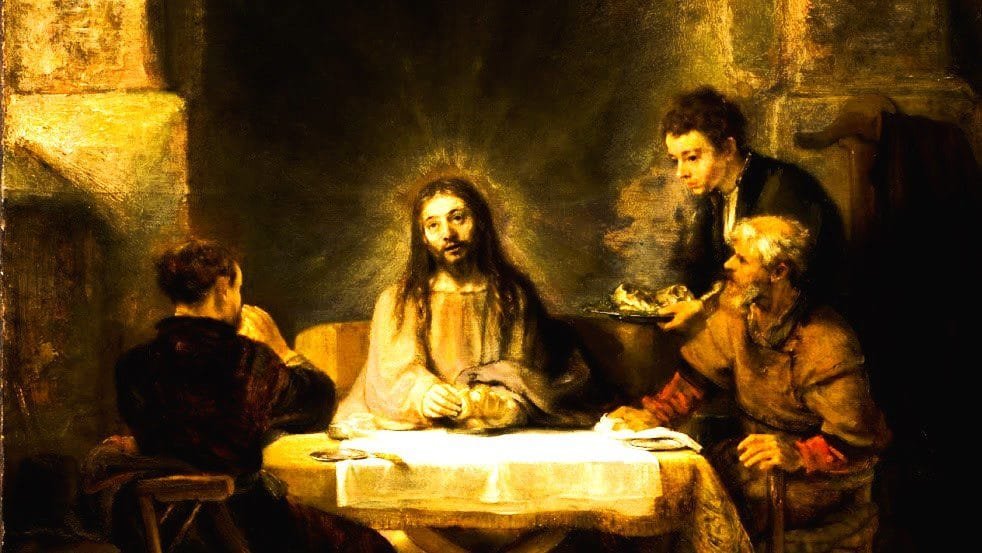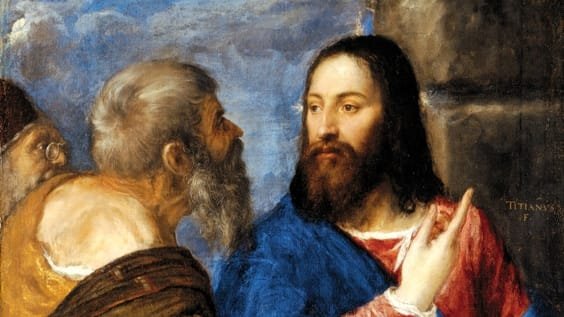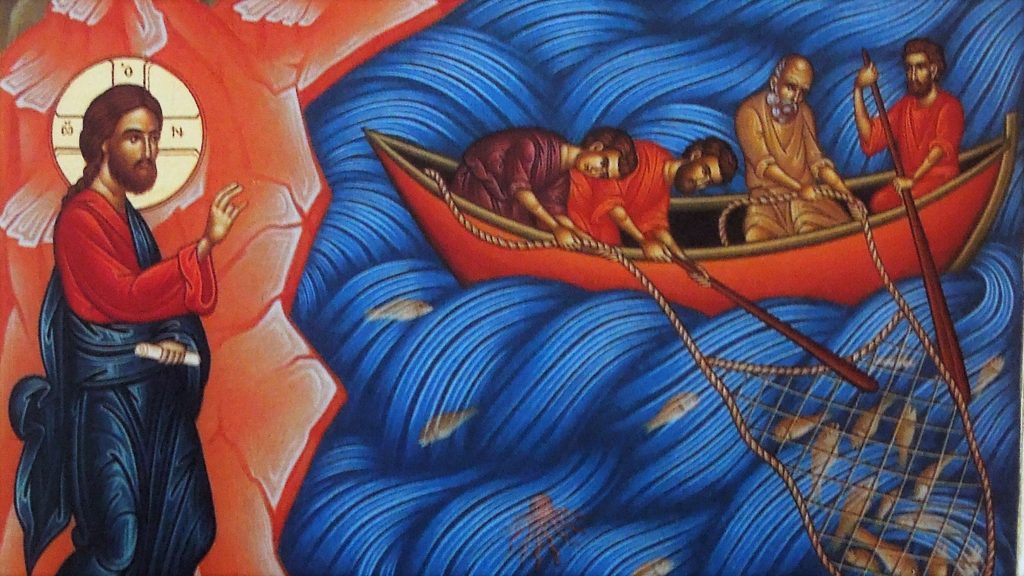Homily Reflection 3rd Sunday of Easter C.
“DO YOU LOVE ME?…FEED MY SHEEP.”
THE CHURCH, PROLONGATION OF CHRIST’S MYSTERY. THE PRIMACY OF PETER.

Dear brethren in Christ, today’s Sunday liturgy offers us an occasion to meditate on the theme of the MYSTERY OF THE CHURCH, THE PROLONGATION OF THE MYSTERY OF OUR LORD JESUS CHRIST, IN WHICH WE HAVE BEEN INCORPORATED THROUGH THE SACRAMENT OF BAPTISM.
During the 50-day Easter celebration, we are reminded that WE ARE LIVING MEMBERS OF THE CHURCH which is a community of RESPONSIBLE WITNESSES OF THE RESURRECTION AND THE SALVIFIC WORK OF OUR LORD JESUS CHRIST IN THE MIDDLE OF THE WORLD.
1.OBEY GOD BEFORE MEN. The 1st Reading is taken from the Acts of the Apostles 5: 27-32. 40-41, Peter and the Apostles, upon being prohibited by the Sanhedrin to preach in Jesus’ name replied:
“We must obey God rather than men. The God of our ancestors raised Jesus, though you had him killed by hanging him on a tree. God exalted him at his right hand as leader and savior to grant Israel repentance and forgiveness of sins. We are witnesses of these things, as is the Holy Spirit whom God has given to those who obey him.”
- Peter and the Apostles were aware of their responsibility to carry out the apostolic mission and authority received from Jesus to preach the Gospel in His Name. The Apostles were carrying out Jesus’ task of redemption and as such historically gave life to the early Church founded by Christ with them as pillars and the believers as a small community of witnesses of Christ, disposed to obey God before men.
- The Church, as a prolongation of Christ’s mystery and His salvific mission, then grew as it is today, through the apostolic succession which remained unbroken throughout these 20 centuries, with Pope Francis succeeding Peter, as the Vicar of the Church, Jesus established with Peter as head. This fact remains more explicit in today’s Gospel.
2. DO YOU LOVE ME?…FEED MY SHEEP. Today’s Gospel taken from Jn 21:1-19 narrates the miraculous catch of fish and Peter’s primacy.
- The miraculous catch of the fish was the 3rd time Jesus revealed Himself to the Apostles after His Resurrection. The Gospel episode leads us to be convinced again that the Apostles are instruments of Jesus and their divine efficacy in their task as pillars of His Church derives from no other than Jesus Himself, and is also the confirmation of their apostolic mission to cast the nets over all over the world to gain souls for Christ.
- Furthermore, Jesus, who had earlier promised that Peter would be the primate of His Church (cf. Mt 16:16-19 and note on same) now confers him the primacy he previously promised and despite Peter’s three denials during our Lord’s Passion.
When they had finished breakfast, Jesus said to Simon Peter, “Simon, son of John, do you love me more than these?” Simon Peter answered him, “Yes, Lord, you know that I love you.” Jesus said to him, “Feed my lambs.” He then said to Simon Peter a second time, “Simon, son of John, do you love me?” Simon Peter answered him, “Yes, Lord, you know that I love you.” Jesus said to him, “Tend my sheep.” Jesus said to him the third time, “Simon, son of John, do you love me?” Peter was distressed that Jesus had said to him a third time, “Do you love me?” and he said to him, “Lord, you know everything; you know that I love you.” Jesus said to him, “Feed my sheep” (Jn 21:15-17).
- St. Josemaria comments:“Jesus questions Peter three times, as if to give him a triple chance to atone for his triple denial. Peter has learned his lesson from the bitter experience of his wretchedness. Aware of his weakness, he is deeply convinced that rash claims are pointless. Instead he puts everything in Christ’s hands. ‘Lord, you know well that I love you’” (St. Josemaria, Friends of God, 267).
- The primacy was given to Peter directly and immediately. So the Church has always understood — and so Vatican I defined: “We therefore teach and declare that, according to the testimony of the Gospel, the primacy of jurisdiction over the universal Church of God was immediately and directly promised and given to Blessed Peter the Apostle by Christ our Lord. . . . And it was upon Simon Peter alone that Jesus after his Resurrection bestowed the jurisdiction of chief pastor and ruler over all his fold in the words: ‘Feed my lambs; feed my sheep” (1st Vatican Council, Pastor aeternus, I).
- The primacy is a grace conferred on Peter and his successors, the Popes; it is one of the basic elements in the Church, designed to guard and protect its unity: “In order that the episcopate also might be one and undivided, and that… the multitude of the faithful might be kept secure in the oneness of faith and communion, he set Blessed Peter over the rest of the Apostles, and fixed in him the abiding principle of this twofold unity, and its visible foundation” (Pastor aeternus, Dz-Sch 3051; cf. Vatican II, Lumen gentium, 18). Therefore, the primacy of Peter is perpetuated in each of his successors: this is something which Christ disposed; it is not based on human legislation or custom.
- By virtue of this primacy, Peter —and each of his successors–, is the shepherd of the whole Church and Vicar of Christ on earth, because he exercises vicariously (in the name and person of) Christ’s own authority. Love for the Pope, whom St Catherine of Siena used to call “the sweet Christ on earth”, should express itself in prayer, sacrifice and obedience.
3. CHRIST, THE TRUE PASCHAL LAMB. In carrying out the salvific mission received from Our Lord Jesus Christ, the Church only seeks the glorification of God the Father, through Our Lord Jesus Christ, the Paschal Lamb, a glorification which will be definite at the end of time, where his dominion will have no end, as narrated in the vision of St. John in the Book of the Revelation 5: 11-14:
“Worthy is the Lamb that was slain to receive power and riches, wisdom and strength, honor and glory and blessing.” Then I heard every creature in heaven and on earth and under the earth and in the sea, everything in the universe, cry out: “To the one who sits on the throne and to the Lamb be blessing and honor, glory and might, forever and ever.”
- Christ, the Lamb, possesses the seven attributes (power, riches, wisdom, strength, honor, glory and blessing) and all these point to the fact that He has everything that belongs to the Godhead.
- The hymn addresses itself to the one seated on the throne (Godhead) and the Lamb and thus puts on the same level God and the Lamb, whose Godhead is being proclaimed. This marks the climax of the universal, cosmic adoration and praise that is rendered the Christ the Lamb. The emphatic “Amen!” of the four living creatures, and the worship offered by the elders bring this introductory vision to a close.
Dear friends, the Catholic Church is the prolongation of Christ’s mystery: it is his Mystical Body. We are all members of His Body, of His Church through the sacrament of Baptism.
- But we must strive in every moment –Lord, You know all things, You know that I love you– to be LIVING members of His Body, that is, strive daily, for love of God, to be in the state of grace, being faithful to Him and His teachings handed to us through His Vicar, the Pope and by being responsible witnesses of His Resurrection with our struggle to live a holy life by which we glorify God. If we persevere till the end, with the help of God’s grace, we shall be counted among those who will cry in adoration, praise and everlasting happiness: cry out: “To the one who sits on the throne and to the Lamb be blessing and honor, glory and might, forever and ever.”
Stay updated to our posts: subscribe by email, lifetime and for free to www.catholicsstrivingforholiness.org. We are also in www.fb.com/CatholicsstrivingforHoliness . Feel free to share our posts so we can have a wider apostolic reach and thus help more people in their Christian life. Thanks! Fr. Rolly Arjonillo.


